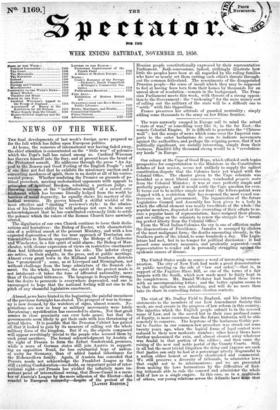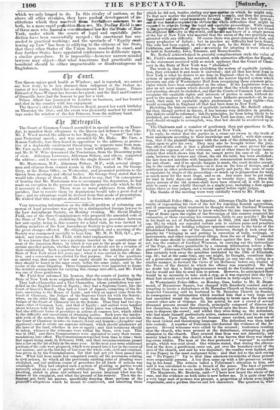The visit of Mr. Dudley Field to England, and his
interesting statements to the members of our Law Amendment Society this week, are real events in the progress of law reform in this country. The injustice which the English people submit to in the revered name of Law, and in the sacred but in their case profaned name of Equity, is more enormous than the future historian will be able remotely to conceive. The keystone of the barbarous Gothic por- tal to Justice in our common-law procedure was struck out some twenty years ago, when the logical forms of legal contest were reduced to their now moderate number ; other heavy blows have further undermined the ruin, and almost cleared away whatever was feudal in that portion of the edifice; and then came the raising of the new and noble portal of the County Courts. Still, in all but the most trivial litigation the delay and expense are such that justice can only be had at a percentage utterly disgraceful to a nation either honest or merely clearheaded and commercial. We still preserve a diversity of tribunals, to administer laws that ought not to be inharmonious; and we are prevented from making the laws harmonious by the difficulties of find- ing tribunals able to rule the concord and administer the whole field of law as a single empire. In this case, as in a multitude of others, our young relations across the Atlantic have done that which we only longed to do. In this rivalry of nations, so far above all other rivalxies, they have pushed development of in- stitutions which they stseeived loom forefathers umeteaon to um both, to a more rapid petection &au we. Mr- Dudley Zield is use of three.men who flumes constitutiatud lasv for theratatte of /ow York, under which the courts of legal and ettnitalble juris- diction have been successfully merged ; the enactment has suc- ceeded in practical working ; and the spectacle of "Equity multi-: lowing up Law" has been so edifying to the citizens of his State, that three other States of the Union have resolved to enact, and four further States have appointed conferences to deliberate upon, a similar procedure. It is impossible—however narrow-minded lawyers may object—that what Americans find practicable and beneficial should be either impracticable or disadvantageous to Englishmen.



























